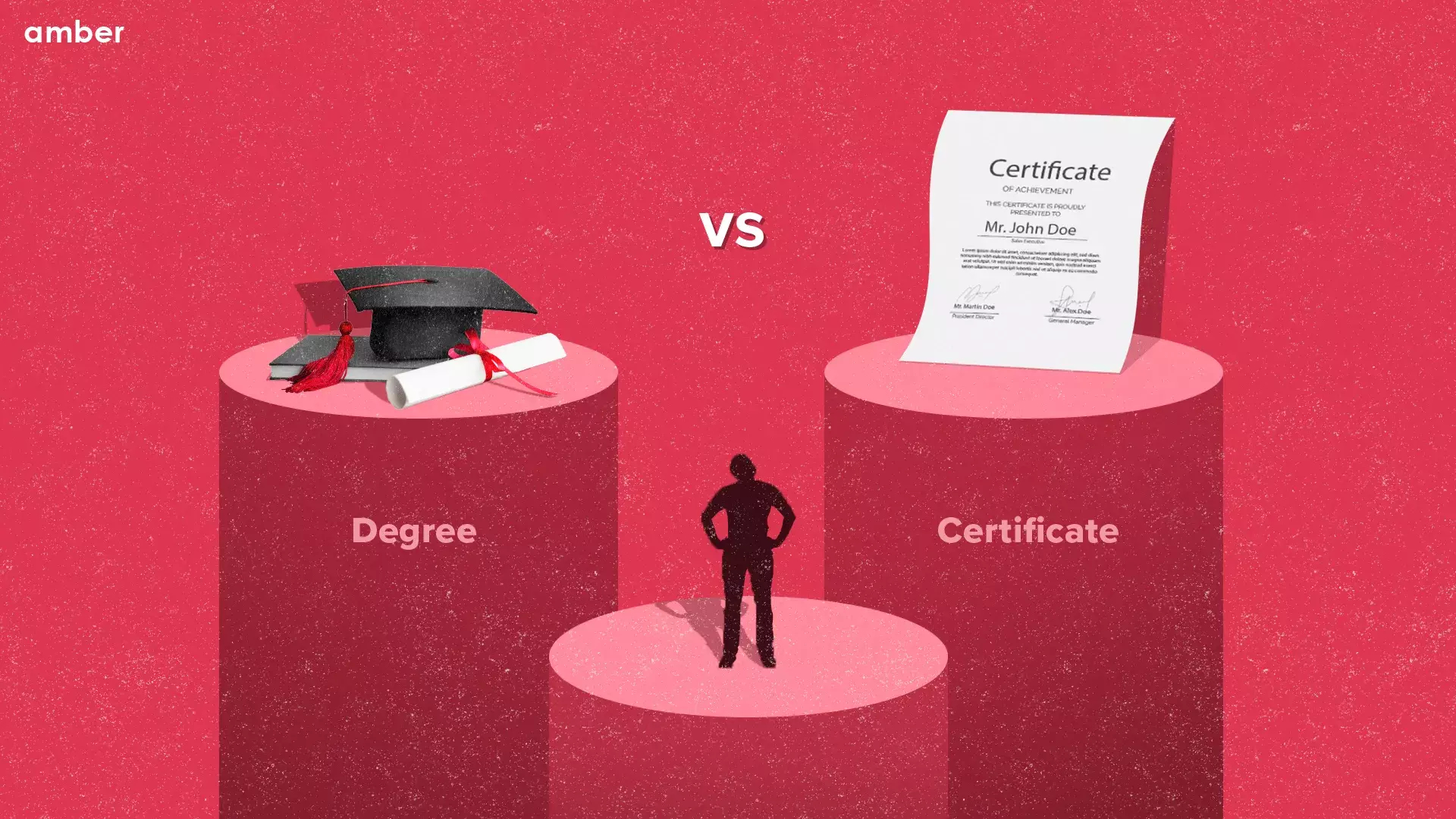In today’s competitive job market, the debate between certifications and degrees has become a central topic for job seekers and professionals alike. With an increasing emphasis on practical skills, many wonder whether traditional degrees still hold the same weight or if specialized certifications are more effective in landing a job. Both paths offer distinct advantages depending on the industry, career goals, and personal preferences.
This blog aims to explore the key differences between certifications and degrees, how each can impact your career prospects, and which option might be best suited for getting hired. Whether you’re considering a career change, fresh out of school, or looking to upskill, understanding the value of each will help guide your decision-making process.
1. Understanding Degrees: The Traditional Route

A degree, typically earned from a university or college, has long been considered the standard requirement for many professional roles. It provides a comprehensive education, covering both theoretical knowledge and practical applications within a specific field. A bachelor’s degree, for instance, opens doors to a variety of entry-level positions, while a master’s or doctoral degree may be necessary for more specialized or leadership roles.
Degrees offer several benefits. First, they provide an in-depth understanding of the subject matter, offering students a broader context of their chosen field. This foundational knowledge can be crucial in industries like healthcare, engineering, law, and education, where theoretical knowledge is critical to understanding complex issues and solving problems.
Additionally, many employers still require a degree as a minimum qualification. For example, large corporations, governmental agencies, and academic institutions often have formal degree requirements for job candidates. This makes degrees a reliable ticket into the workforce and a long-term career.
However, the time and cost associated with earning a degree are significant drawbacks. Four years of undergraduate education or additional years for a master’s or doctoral program can be expensive, and many students graduate with substantial student loan debt. The traditional education route can also take several years to complete, which might be impractical for those seeking faster career progression.
2. Certifications: The Fast-Track Alternative
In contrast to a degree, a certification is a specialized credential that demonstrates your expertise in a specific skill or industry. Certifications are usually earned through online courses, workshops, or training programs offered by professional organizations, universities, or platforms like Coursera, LinkedIn Learning, and Udacity. These programs often focus on practical skills that are directly applicable to a particular job.
One of the biggest advantages of certifications is their speed and affordability. Many certifications can be completed in a matter of weeks or months, allowing individuals to upskill quickly and enter the workforce sooner than they might with a traditional degree. The low cost of many certification programs also makes them an attractive option for those looking to enhance their career without going into debt.

Certifications are particularly popular in fields that require specialized knowledge or technical expertise, such as IT, digital marketing, project management, and cybersecurity. For example, certifications like Google’s Digital Marketing Certificate, Cisco’s CCNA, or CompTIA’s A+ are highly regarded by employers and can significantly boost a candidate’s chances of landing a job in those fields.
Furthermore, certifications can also be an excellent way to pivot or advance in your career. If you’re looking to transition into a new industry or specialize in a specific skill set, earning a relevant certification can quickly show employers that you have the necessary expertise. Certifications also provide a way to keep up with evolving industries and technologies, ensuring that your skills remain up-to-date and relevant.
3. Job Market Demand: How Employers View Certifications vs. Degrees
When it comes to hiring, employers typically look for candidates who can demonstrate their ability to contribute immediately to their business. The importance of a degree or certification often depends on the role and industry.
In traditional fields such as law, healthcare, and engineering, degrees remain essential. These industries require deep knowledge and often have strict licensing and accreditation requirements that can only be obtained through formal education. For example, to become a doctor, lawyer, or engineer, a degree is not just recommended but required.
However, in more dynamic, tech-driven industries such as IT, digital marketing, and data analysis, certifications are increasingly valued. In fact, some tech companies, including giants like Google and Apple, no longer require a traditional four-year degree for certain positions, instead focusing on practical skills demonstrated through certifications and hands-on experience. A certification in a specific area such as cloud computing, cybersecurity, or data analytics can make you more competitive in these fields, as employers know you are already trained in the specific tools and technologies they use.
In some cases, certifications can even be a way to bypass the need for a degree. For example, if you’re pursuing a career in software development, earning certifications in programming languages like Python, JavaScript, or Java can help you secure a job much quicker than a traditional computer science degree. The emphasis on practical skills over formal education is particularly evident in industries that prioritize innovation and adaptability.

4. Cost and Time Investment: Weighing the Pros and Cons
A significant difference between certifications and degrees lies in the investment of time and money. A degree program typically takes four years to complete for an undergraduate, and even longer for graduate degrees. The cost of tuition, textbooks, and other fees can amount to tens of thousands of dollars, and many graduates are left with substantial student loan debt.
On the other hand, certifications are generally more affordable. Most certification programs cost only a few hundred to a few thousand dollars, and many can be completed in a matter of months, making them an attractive option for those who want to minimize debt and complete their education quickly. Additionally, some employers offer funding for certifications, further reducing the financial burden.
While the upfront cost of certifications is lower, it’s important to consider the long-term value. Some certifications require renewal after a few years, meaning that you’ll need to invest time and money into keeping your credentials up-to-date. Nevertheless, for many professionals, the quicker return on investment and the ability to gain specific skills faster makes certifications a compelling option.
5. Which Option Is Right for You?
The choice between a degree and a certification depends on your career goals, the industry you’re targeting, and the specific skills you need to develop.
- Choose a Degree If:
- You’re entering a traditional profession that requires formal education (e.g., medicine, law, engineering).
- You prefer a comprehensive, structured educational experience with long-term career growth.
- You’re interested in working for large corporations or institutions that have strict degree requirements.
- Choose a Certification If:
- You want to quickly gain job-ready skills in high-demand fields like IT, marketing, or project management.
- You’re looking for a cost-effective and time-efficient way to advance or change careers.
- You’re focused on hands-on experience and specialized knowledge rather than theoretical education.
Conclusion: Certifications and Degrees Can Work Together
Ultimately, the decision between certifications and degrees is not always an either/or choice. Many professionals benefit from a combination of both. For example, obtaining a degree can provide the foundational knowledge and credibility needed for long-term career growth, while certifications can supplement that education by offering specialized skills and immediate job readiness.
As the job market continues to evolve, it’s clear that both degrees and certifications have a place. The key is to assess your career goals, understand the demands of your chosen field, and pursue the path that best aligns with your professional aspirations. Whether you choose a degree, a certification, or a combination of both, investing in education and upskilling will always enhance your chances of getting hired and advancing in your career.

Leave a Reply